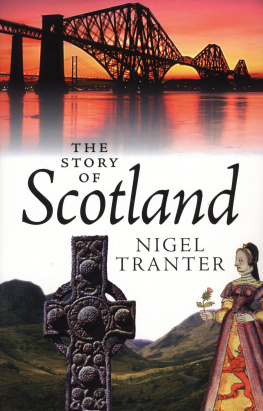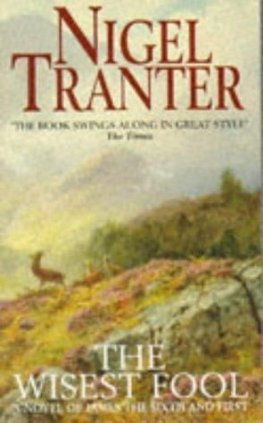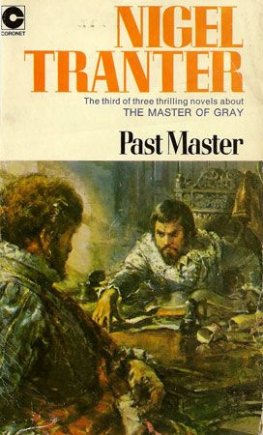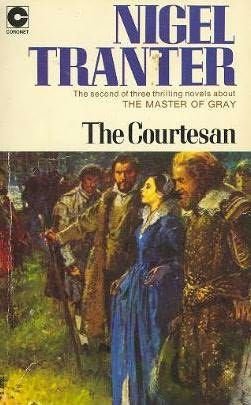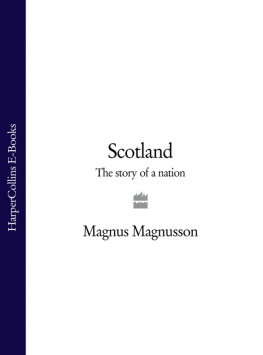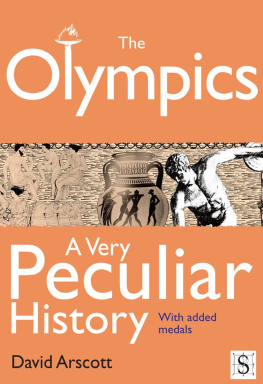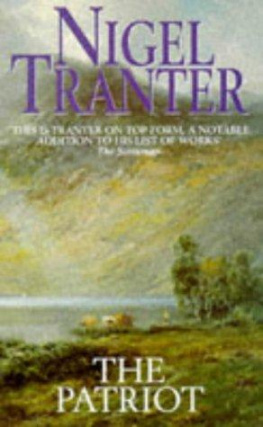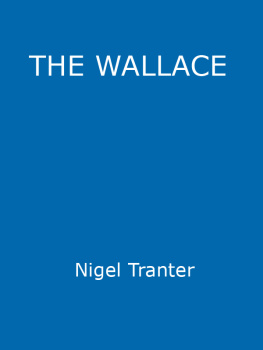Reviews of Story of Scotland on Amazon.
I have read Nigel Tranters fiction before and Ive always enjoyed his tales of Scottish history and this is just as good if not better. Its as easy to read as any of his historical fiction and Nigel Tranter can bring the past to life so well.
S Wornham.
This book is simply BRILLIANT. Nigel Tranter tells the story of Scotland in an exciting way and this book is both easy to read and very enjoyable. Should be compulsory reading for any Scot.
David Smith.
Well written without being boring. Tranter was one of the best writers, and I am a big fan of his.
J Lees.
This book covers the entire history of Scotland. It is easy to read and extremely entertaining a great book for anyone with very little knowledge of Scotlands history. I would highly recommend it to anyone who has been to Scotland or plans to visit.
C Nimmons.
The Story of Scotland by Nigel Tranter encompasses Scottish history from Misty Origins (the first chapter) to the twentieth century. The book addresses a huge breadth of subject material, romping through Scottish history whilst commentating on events, people, movements and politics. The book was first published in 1987, before Scottish devolution, and it is still readily available nearly 25 years after initial publication.
Nigel Tranter (1909-2000) declares in the Preface to The Story of Scotland that he is a storyteller not a historian. Yet he has an impressive understanding of Scottish history. A prolific fiction author, he wrote a number of books based on key Scottish events and/or historical figures including The Bruce Trilogy and The Stewart Trilogy. He also wrote childrens books, Westerns (under the pen name Nye Tredgold) and non-fiction books about Scotland he had a particular interest in Scottish castles. He had a gift for pulling threads of fact into readable fiction, presenting complex ideas in an accessible format. This book does not have a list of sources, but it does draw on a lifetime of exploration of Scotland a land renowned for its oral traditions.
I found myself immediately drawn in by the conversational writing style of The Story of Scotland. I could hear the strong voice of the author in my head as I read. Observations came thick and fast, illuminating material and reinforcing memory. An example Tranter asserts that the Picts painting themselves instead of wearing clothes, a fact the author was told at school, does not hold weight if you think of the climate they lived in; he also points out that carvings of Picts show them wearing clothing. He links the craving for a homeland common in those of Scottish ancestry with Pictish religious beliefs one of many engaging theories about Scottish history and culture proposed in the book.
If you know nothing about Scottish history, you may find this book a useful introduction. If you have dabbled in Scottish history, this book can illuminate areas of darkness. If your approach is academic/scholarly, try this book as a quick read it may kick-start thinking in new directions.
I found this book in a local charity shop and debated before buying whether I needed another book about Scottish history I am so glad I did buy it, as it provides a unique, creative and heartfelt celebration of all that was and is Scotland.
A Sahni.
CONTENTS
PREFACE
Let there be no mistake about this I am not setting out to write a history book. For one thing, I am not a qualified historian only a storyteller with an interest in history. For another, all too often history books are dull, and that in my eyes is a crime. How anyone can make history dull and boring is beyond my conception, especially when it is Scotlands history, which is amongst the most dramatic, colourful and exciting. The story of Scotland embodies the very essence of mankinds greatness and weakness, efforts and failures, heroics and cowardices, ambitions, knaveries and follies indeed everything upon which good storytelling is based. Yet generation after generation of academic historians have somehow managed to make history dull for millions of folk by producing catalogues of dates, births, deaths and marriages, wars, treaties, alliances, movements and so on. All these, to be sure, do make up the skeleton, as it were, of history; but the flesh consists of the stories of men and women like you and me, their trials, temptations, triumphs, treacheries, even tendernesses. If I did not know better for I have to read endless history books, woe is me I would defy anyone to make all that dull.
So this is a story book, but about real people, folk who lived and died, loved and hated, fought and suffered, laughed and wept, and in doing so grew into a nation, a great nation which, though small in numbers, is accepted the world over as amongst the foremost in character and achievement ... and folly! The Scots are a very odd people and always have been, a sort of animated contradiction in terms, capable of higher heights and lower depths than most; courageous, adventurous, intemperate, disputatious, romantic however much they may disclaim it sentimental, religious in the widest sense, and much more. All of which ensures that their history has to be the very contrary of dull, and much of it scarcely believable, in fact.
I have tried to be as accurate as possible in my storytelling, but strict accuracy in history is seldom achieved, even by the most learned and prosaic historians. When you consider that all history books have to look forever backwards, quoting this authority and that for their statements, each of which have quoted other authorities further into the past, you eventually get to the original source material. And then you are apt to find that this, the very first account, can be so very suspect. Why? First of all, most were written by the winners, not the losers; and secondly it was all too often not written first-hand, for so many of the folk who actually made history could not write and had to go to the more learned monks, priests and scribes, who could. And because these chroniclers seldom ventured outside their cloisters and monasteries, their accounts of events, especially battles, campaigns, secret deals and plots, and so on, are frequently wildly at odds with reality, as anyone going over ancient battlefields can vouch. And yet they have been quoted as gospel source material down the ages by hundreds of equally cloistered historians and students. The novelists first preoccupation, after making his reader want to know what happened next, is the suspension of disbelief an absolute essential in storytelling. And, believe me, that can be the very hardest of tasks in rewriting so-called received history.
So what follows is an attempt to put the story into history, albeit on a very superficial scale, for a nations story is only to be hinted at in the compass of one very modest volume, especially such an ancient and lively nation as Scotland. It will be to my grief, and probably my well-deserved shame, if, after all this, readers in the end find it dull. I suppose that I have almost asked for it?
Nigel Tranter
Gullane, East Lothian, 1987.
Chapter 1
MISTY ORIGINS
If you are not interested in misty origins, you can skip this. Yet you might find something that rings a bell.
Where to begin in trying to tell the long story of Scotland? In most stories, it is no bad idea to start at the beginning. But when the beginning is so far back in uncharted time, and more misty than the Isle of Skye, that is not so easy. Especially as it is not even Scotland we are really talking about, for beginnings, but Alba, the Pictish kingdom, Scotland, as such, not being so-called until the ninth century. And the Picts of Alba claimed to have the most ancient origins and line of kings in all Christendom, going back 1070 years according to one authority, precisely 1360 years according to another not from today, mark you, but from before that ninth century. Indeed they give the genealogy of their kings, going backwards from one Cruithne to the Flood Cruithne being their own name for their nation, as well as this king, the Gaelic word cruithne meaning wheat-grower, which is highly significant, implying a settled civilisation of agriculturalists in an age of hunters, raiders and nomads. Anyway, this King Cruithne, period somewhat vague, was mac or son of Cinge, mac Luthtai, mac Parthalan, mac Agnoinn and so on right back to Japheth mac Noah! So you see my difficulty?

